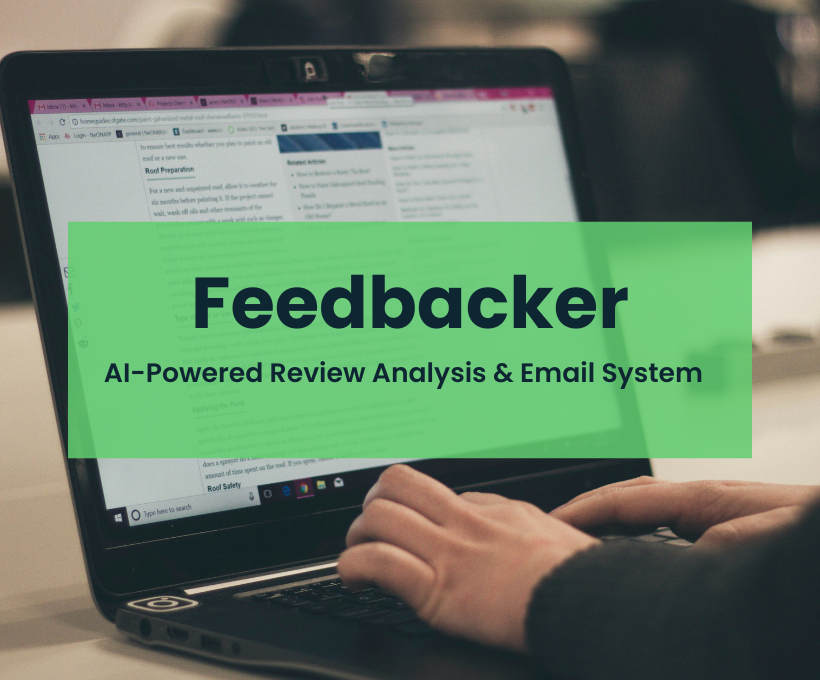Introduction
Customer feedback plays a crucial role in shaping business decisions. However, manually analyzing and responding to every review can be time-consuming. Feedbacker is an AI-powered system that automates this process by classifying customer reviews, generating appropriate responses, and sending them via email.
The project utilizes OpenAI’s GPT-4o, LangChain, and SMTP (Google Mail) to provide an intelligent and automated solution. This blog post will walk through its architecture, technical implementation, ethical considerations, and the impact of automating feedback management.
Project Overview
🔹 What is Feedbacker?
Feedbacker is an AI-driven tool that processes user reviews in three steps:
1️⃣ Sentiment Classification – Determines if a review is positive, neutral, or negative.
2️⃣ Response Generation – Generates an AI-powered reply for positive and neutral feedback.
3️⃣ Email Integration – Sends feedback responses via Google SMTP, or notifies an agent for negative reviews.
🎯 Why Did I Build This?
The idea stemmed from the need to automate feedback processing while ensuring human intervention for critical cases. Many businesses struggle with responding to reviews effectively, so this tool aims to:
✅ Reduce manual effort in analyzing feedback.
✅ Ensure timely responses to customers.
✅ Improve customer satisfaction through personalized replies.
Technical Implementation
🏗 Technology Stack
- Python – Core language for development.
- LangChain – For integrating OpenAI’s GPT-4o.
- OpenAI GPT-4o – For natural language processing (NLP) tasks.
- SMTP (Google Mail) – For sending automated responses.
- dotenv & YAML – For environment and configuration management.
📜 System Workflow
- User Input – The user submits a review.
- Sentiment Analysis – The review is classified into positive, neutral, or negative using GPT-4o.
- Feedback Generation – AI generates a personalized response for positive and neutral reviews.
- Email Handling –
- If the review is positive/neutral, a feedback email is sent.
- If the review is negative, an agent receives a predefined alert email.
Code Walkthrough
🚀 1. Sentiment Classification
self.classification_template = ChatPromptTemplate.from_messages([
('system', self.config['classification_role']),
('human', self.config['fb_classification_prompt'])
])
self.classification_chain = self.classification_template | self.model | StrOutputParser()
This LangChain pipeline classifies the review sentiment based on a predefined system role and prompt.
📩 2. Response Generation Based on Sentiment
branches = RunnableBranch(
(
lambda x: 'positive' in x.lower(),
self.positive_fb_template | self.model | StrOutputParser(),
),
self.neutral_fb_template | self.model | StrOutputParser()
)
The system dynamically chooses the correct response based on sentiment.
📧 3. Email Sending via SMTP
def send_email(self, mail_to: str, message: str, is_receiver_agent: bool = False) -> str:
subject = self.agent_subject if is_receiver_agent else self.customer_subject
message = self.agent_message if is_receiver_agent else message
mail = self._prepare_mail(mail_to, subject, message)
try:
with smtplib.SMTP_SSL("smtp.gmail.com", 465) as server:
server.login(self.sender_email, self.app_password)
server.sendmail(self.sender_email, mail_to, mail.as_string())
return "Email sent successfully!"
except Exception as e:
return f"Error: {e}"
This function ensures secure email transmission using Google SMTP.
Ethical Considerations
1. Avoiding Biased AI Responses
Since the system relies on AI-generated text, it’s crucial to prevent biased or misleading responses. To mitigate this:
✅ The prompts are designed to ensure neutrality.
✅ The system avoids generating responses for negative feedback, encouraging human intervention.
2. User Privacy & Data Handling
Since the system processes user-generated reviews and email IDs, privacy is a major concern:
✅ No user data is stored permanently.
✅ Secure SMTP is used to ensure email privacy.
✅ Environment variables (dotenv) are used to protect credentials.
3. Maintaining a Human-in-the-Loop
While AI handles most feedback, negative reviews are escalated to a human agent. This ensures:
✅ Critical issues are handled manually instead of by AI.
✅ Companies can address serious concerns more effectively.
Impact & Benefits
🚀 1. Increased Efficiency
Manual feedback handling is slow. Feedbacker:
✅ Reduces response time significantly.
✅ Ensures consistent replies without human fatigue.
🎯 2. Improved Customer Satisfaction
Quick, AI-powered responses create:
✅ Better customer engagement.
✅ Stronger brand trust.
🔔 3. Optimized Human Effort
Agents only intervene for negative feedback, saving time and resources.
Lessons Learned & Future Improvements
🔹 Challenges Faced
- Ensuring AI-generated responses are accurate and professional.
- Handling email authentication issues with Google SMTP.
🚀 Planned Enhancements
✅ Multilingual Support – Expanding AI feedback generation for multiple languages.
✅ Feedback Dashboard – Visualizing sentiment trends over time.
✅ Better AI Customization – Allowing businesses to modify AI-generated responses as per their needs.
Final Thoughts
This project was an exciting opportunity to combine AI, automation, and real-world business needs. AI-driven solutions like Feedbacker can revolutionize customer engagement while ensuring ethical AI use.
If you’re interested in trying it out, check the GitHub Repository 🚀.
🔗 Connect With Me
If you have suggestions, want to collaborate, or have feedback, feel free to connect with me on LinkedIn or check out more of my work! 🚀
